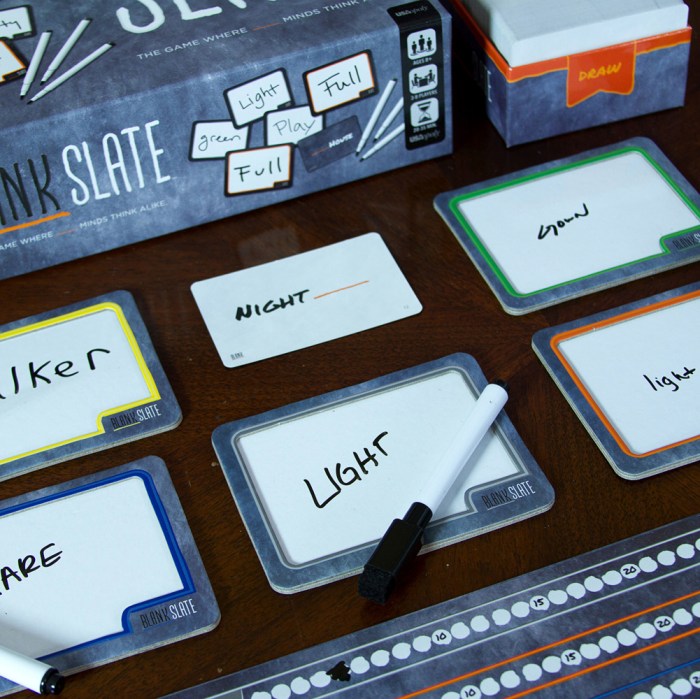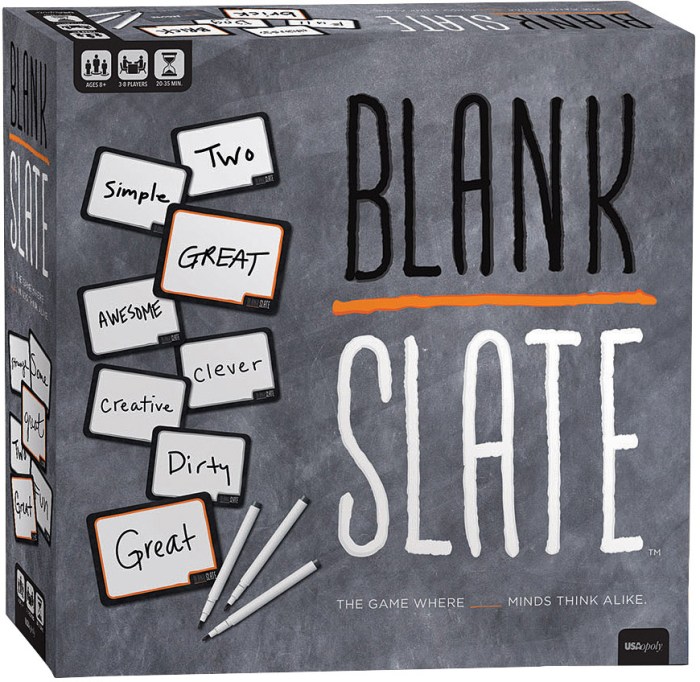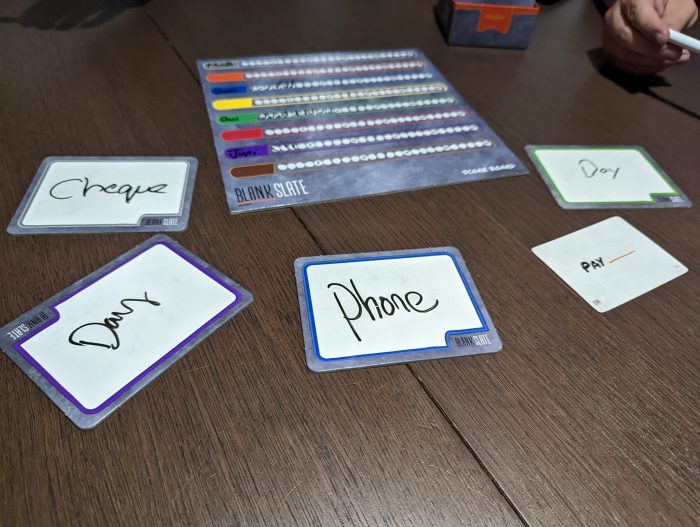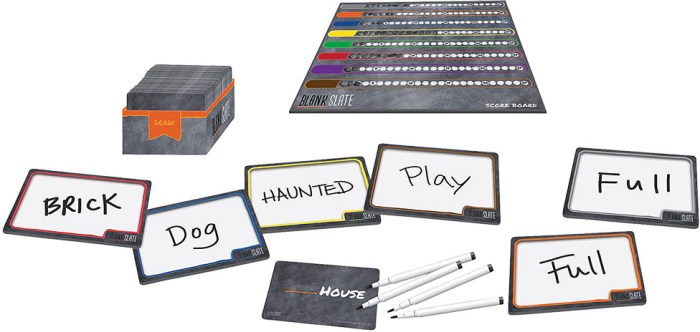Welcome to the blank slate game words list, your ultimate guide to crafting captivating game worlds and unforgettable characters. Dive into a treasure trove of words that will ignite your imagination and empower you to weave immersive stories that will keep players spellbound.
From character attributes to worldbuilding elements and storytelling techniques, this comprehensive list has everything you need to bring your game concepts to life. Let the words flow and inspire you to create game worlds that are rich, engaging, and utterly unforgettable.
Game Concepts: Blank Slate Game Words List

Blank slate games are role-playing games where players create their characters and world from scratch. To facilitate this, these games often provide a list of common words that can be used to describe characters, settings, and events.
Ready to challenge yourself with a blank slate game words list? Check out the letrs unit 5-8 post test to put your skills to the test. Afterward, come back to this list and see how much you’ve improved!
These words are essential for creating a cohesive and believable game world. They provide a shared vocabulary that players can use to communicate with each other and describe their characters and surroundings.
Character Creation
Character creation is one of the most important aspects of any role-playing game. In blank slate games, players have the freedom to create their characters from scratch. This means choosing their character’s race, gender, appearance, and personality.
The following words can be used to describe a character’s appearance:
- Age
- Gender
- Height
- Weight
- Hair color
- Eye color
- Skin color
- Build
- Clothing
The following words can be used to describe a character’s personality:
- Alignment
- Personality traits
- Flaws
- Ideals
- Bonds
Setting
The setting of a role-playing game is just as important as the characters. The setting provides the backdrop for the story and can have a major impact on the way the game is played.
The following words can be used to describe a setting:
- Location
- Climate
- Terrain
- Culture
- History
- Government
- Religion
Events
Events are the things that happen in a role-playing game. They can be anything from a simple conversation to a major battle.
The following words can be used to describe events:
- Type of event
- Location
- Time
- Participants
- Outcome
Character Creation
Character creation is a fundamental aspect of any blank slate game. It allows players to express their creativity and individuality by designing characters that are unique and memorable. To help you create characters that stand out, here’s a comprehensive list of words that describe character attributes:
Physical Attributes
- Age
- Height
- Weight
- Hair color
- Eye color
- Skin color
- Body type
- Facial features
- Clothing style
- Accessories
These physical attributes can be used to create characters that are visually distinct and easy to recognize. For example, a tall, muscular character with long black hair and piercing blue eyes will be much more memorable than a generic character with no distinguishing features.
Personality Attributes
- Alignment
- Intelligence
- Charisma
- Courage
- Compassion
- Ambition
- Sense of humor
- Quirks
- Flaws
Personality attributes define the inner workings of a character. They determine how a character thinks, feels, and acts. By combining different personality attributes, you can create characters that are complex and believable. For example, a character who is intelligent and charismatic but also ambitious and ruthless will be much more interesting than a character who is simply good or evil.
Background Attributes, Blank slate game words list
- Occupation
- Education
- Family
- Friends
- Enemies
- Goals
- Motivation
- Backstory
Background attributes provide context for a character’s personality and actions. They help to explain why a character is the way they are and what drives them to do the things they do. By developing a rich backstory for your characters, you can make them more relatable and immersive.
By combining physical, personality, and background attributes, you can create characters that are unique, memorable, and engaging. These characters will help you to tell stories that are both entertaining and thought-provoking.
Worldbuilding

Worldbuilding is the process of creating the setting for your game, including the landscapes, cultures, and histories of the world. It’s an important part of game design, as it helps to create a sense of immersion and realism for the players.
There are many different elements that go into worldbuilding, and each one can be customized to fit the specific needs of your game. Here is a table with some of the most common worldbuilding elements and their associated words:
Landscapes
The landscapes of your world can have a big impact on the gameplay. For example, a world with a lot of mountains and forests will be more difficult to travel through than a world with open plains. Some words to describe landscapes include:
- Mountains
- Forests
- Plains
- Deserts
- Oceans
Cultures
The cultures of your world will shape the way that the people in it live and interact with each other. Some words to describe cultures include:
- Language
- Religion
- Government
- Economy
- Social structure
Histories
The histories of your world will help to explain why the world is the way it is today. Some words to describe histories include:
- Wars
- Revolutions
- Invasions
- Discoveries
- Technological advancements
Storytelling

In the realm of storytelling, words possess the power to evoke emotions and craft compelling narratives. These words serve as the building blocks of immersive experiences within the game world.
By carefully selecting and weaving these evocative words, game designers can create stories that resonate with players on a profound level. These words ignite imaginations, foster empathy, and transport players into a realm of wonder and possibility.
Emotive Vocabulary
To effectively convey emotions and create engaging narratives, consider incorporating the following words into your game’s dialogue, descriptions, and narrative:
- Adjectives:Enchanting, enigmatic, haunting, ethereal, poignant, bittersweet, evocative
- Verbs:Yearn, yearn, quiver, shimmer, whisper, caress, linger
- Nouns:Enigma, solace, epiphany, yearning, reverie, labyrinth, sanctuary
- Adverbs:Poignantly, tenderly, hauntingly, subtly, evocatively, gracefully
These words, when used thoughtfully, can evoke a wide range of emotions and create a tapestry of experiences that immerse players in the game world.
Game Mechanics

Game mechanics are the rules and systems that govern how a game is played. They determine the actions that players can take, the interactions between players and the game world, and the outcomes of those actions.
Game mechanics can be divided into three main categories: actions, interactions, and rules.
Actions
Actions are the things that players can do in a game. These can include moving, attacking, casting spells, or interacting with objects.
- Move: The action of changing the position of a character or object in the game world.
- Attack: The action of attempting to cause damage to another character or object.
- Cast spell: The action of using a magical ability to produce a desired effect.
- Interact with objects: The action of using or manipulating objects in the game world.
Interactions
Interactions are the ways in which players can interact with each other and the game world. These can include combat, trading, or cooperation.
- Combat: The interaction between two or more characters or objects that involves attempting to cause damage to each other.
- Trading: The interaction between two or more characters or objects that involves the exchange of goods or services.
- Cooperation: The interaction between two or more characters or objects that involves working together to achieve a common goal.
Rules
Rules are the guidelines that govern how the game is played. These can include rules for movement, combat, and interactions.
- Movement rules: The rules that govern how characters and objects can move around the game world.
- Combat rules: The rules that govern how combat is conducted, including how damage is calculated and how characters can defend themselves.
- Interaction rules: The rules that govern how characters and objects can interact with each other, including how trading and cooperation are conducted.
Essential FAQs
What is the purpose of the blank slate game words list?
The blank slate game words list provides a comprehensive collection of words and phrases commonly used in game design to help game developers create rich and engaging game worlds, characters, and stories.
How can I use the blank slate game words list to create unique characters?
The character creation section of the list offers a wide range of words that describe character attributes, motivations, and backgrounds. By combining these words in creative ways, you can craft unique and memorable characters that drive your game’s narrative.
What are some tips for using the blank slate game words list for worldbuilding?
The worldbuilding section of the list includes words for describing landscapes, cultures, histories, and more. Use these words to create immersive and believable game worlds that captivate players and draw them into your story.